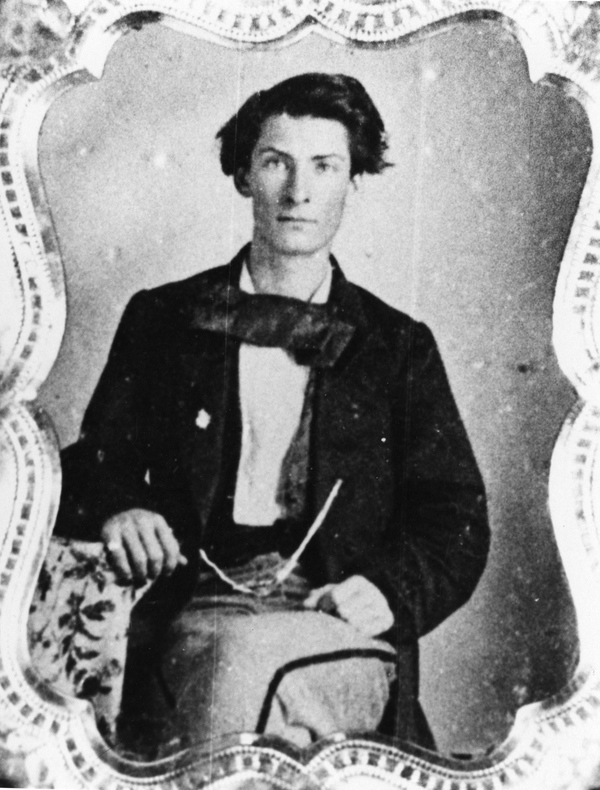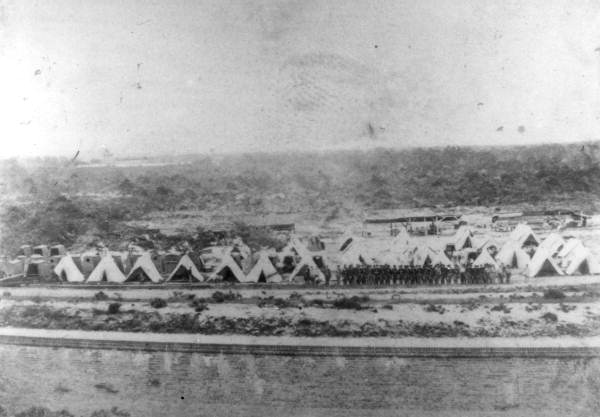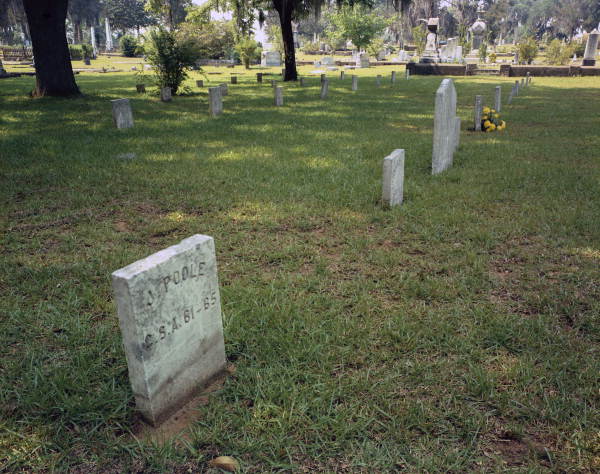Description of previous item
Description of next item
Civil War Letters Home: Roderick Gospero Shaw
Published September 9, 2014 by Florida Memory
Of all the Civil War documents here at the State Archives, letters from soldiers to their loved ones are some of the most engaging. Many of the young men who signed up for military service at the beginning of the war were eager, confident, and impatient to get into the fray and make a name for themselves.
Roderick Gospero Shaw of Attapulgus, Georgia enlisted at Quincy in April 1861 in the “Young Guards,” a unit of the “old” First Florida Infantry. He served one year in this unit, and later re-enlisted in August 1862 in the 4th Florida Infantry at Chattanooga. The State Archives of Florida holds typewritten transcripts of nearly a dozen of Shaw’s letters to his sister, Mrs. Jesse Shaw Smith, who lived in Quincy for much of the war (Collection M87-6).
Shaw’s early letters betray his impatience as a young soldier ready for action. In May 1861, he wrote to his sister Jesse that members of his company were dismayed to be limited mostly to loading wagons with supplies and digging post holes for camp improvements. He was resolved not to share his displeasure with anyone else, however.
“I came for the purpose of making a soldier of myself as long as I was here,” Shaw explains, “and [to] lay off the ‘Gentleman’ and ‘Dandy.’ It is rather hard to do, but I think I act it as well as any of the boys.” Shaw held out hope that his unit would see action soon. “I would not be surprised,” he tells Jesse, “to hear the roaring of cannons any morning instead of the drum for reveille.”
As the war dragged on, Shaw began sharing sentiments so many soldiers on both sides felt – weariness with camp life and the desire to see loved ones back home. In a May 1863 letter to Jesse, Shaw describes the bland contents of the average soldier’s diet while campaigning.
“Meal after meal we sit to cornbread (once in a while a little flour), bacon and water,” he laments. “We consider ourselves fortunate if perchance we obtain a quart of buttermilk occasionally for 50 cents. I had the pleasure yesterday of partaking of a ham of mutton at dinner. Butter cannot be procured anywhere.”
Shaw’s letters often speak of his wanting to come home on furlough, but he resolves to do his duty as a loyal soldier and stay with the Army.
“I wish I could be at home with you,” he tells Jesse in December 1862, “but it is impossible. My country needs my services and, til peace is declared, I expect to remain with the Army.”
Shaw was not only eager to remain with the Army, but also to move up in the ranks. In several letters, he explains to Jesse that he has been studying military tactics and taking on leadership roles in his company so as to support his application for an officer’s position. He asks often for cloth or ready-made clothing so as to improve his appearance and distinguish himself. After achieving the rank of sergeant major, Shaw muses to Jesse in one letter about having a horse and assistant to accompany him.
“Should I ever get home, I will expect to live more at ease on my return to camp. The first thing I will want is a boy to cook for me and attend to other little necessaries. As it is it costs more to live in camp than at home, and much more troublesome. […] I wrote to Uncle Tom about buying a horse, but there is a question as to whether the promoted major is entitled to it or not…” (R.G. Shaw to Jesse Shaw Smith, Nov. 5, 1861).
Shaw received the promotion he had so earnestly hoped for in October 1863. He was transferred to Company E, 4th Florida Infantry, and made a 2nd Lieutenant.
“I do not feel very proud of it yet as I think I have no right to it for skill and valor,” he tells Jesse in January 1864, “but by Summer I will either deserve it or the brand of coward.”
Shaw’s words proved to be prophetic. General William Tecumseh Sherman took command of the Union’s western forces in March 1864, and began preparing to march southward toward Atlanta.
“This Spring will be the most important period of the war,” Shaw writes in one letter sent just before Sherman took command. “It will prove the point of culmination. The mighty hosts of the invader will be driven back or Rebellion will tremble.”
Shaw would lose his life in the Confederate attempt to halt Sherman’s advance. On May 27, 1864, he began a letter to his Uncle Thomas Smith in Attapulgus, Georgia, which he never finished. His last written words were: “I leave now for a skirmish myself for 24 hours. Goodbye until tomorrow evening.”
Tomorrow evening did not come for Lt. Roderick Gospero Shaw. A letter to his uncle from one of his comrades reported that he had been killed in a skirmish near Dallas, Georgia. With the weather warm and no means available to transport the body quickly to any cemetery, he was laid to rest not far from the road between Dallas and Marietta. Shaw had just turned 21.
Stories such as Lieutenant Shaw’s abound in the many letters, diaries, reports, and other materials available at the State Archives of Florida. For more information, check out our Guide to Civil War Records, and visit us to see what materials may be available to help you research the Civil War soldiers in your family tree.
Cite This Article
Chicago Manual of Style
(17th Edition)Florida Memory. "Civil War Letters Home: Roderick Gospero Shaw." Floridiana, 2014. https://www.floridamemory.com/items/show/295219.
MLA
(9th Edition)Florida Memory. "Civil War Letters Home: Roderick Gospero Shaw." Floridiana, 2014, https://www.floridamemory.com/items/show/295219. Accessed February 13, 2026.
APA
(7th Edition)Florida Memory. (2014, September 9). Civil War Letters Home: Roderick Gospero Shaw. Floridiana. Retrieved from https://www.floridamemory.com/items/show/295219

 Listen: The Assorted Selections Program
Listen: The Assorted Selections Program


